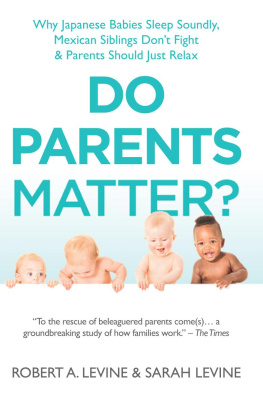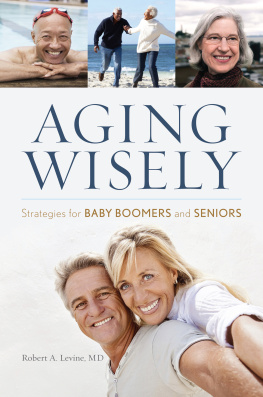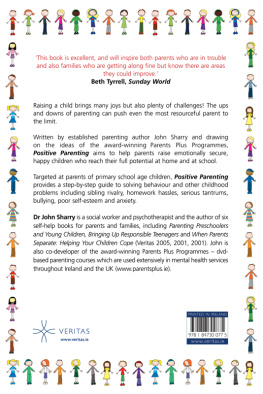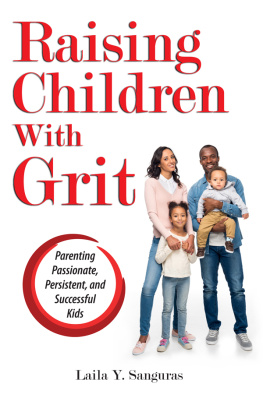IN 1969, RECENTLY married but not yet parents, we went to a small Nigerian town in the Sahel region south of the Sahara Desert in West Africa on our first field project together. Our goals were to discover how the Hausa people raised their children and to compare their parenting practices with those of America and Europe, beginning with infant care and the social attachment of infants to their mothers.
The Hausa are West Africas largest ethnic group. Most are Muslims, but they share many family life and child care customs with other West African peoples regardless of religion: polygamy, early marriage for girls, high rates of divorce, child fostering and adoption, and kin-avoidance practices (rules forbidding certain types of social contact within the family). Over seven months, Sarah was welcomed into dozens of households of women secluded from men (including Bob) to talk with mothers and grandmothers and observe babies and young children. Her experience raised questions about what constitutes adequate infant care, questions that remain with us today.
Sarah met fifteen-year-old Rabi, who had given birth to Amina, her first child, in her husbands home. Rabi had brought her four-month-old infant daughter to her parents house for an extended visit. During the half-hour Sarah spent in the house one morning, Rabis mother, Delu, held her plump, bright-eyed granddaughter Amina on her lap. But Rabi, who was sitting about a yard away, didnt look at or speak to the baby. Every so often a group of children would run up, play with Aminas fingers and toes, make her laugh, and run away. Deserted, Amina would start to cry, prompting the grandmother to hand her to Rabi, who would nurse her, stony-faced.
Anthropologists are expected to cultivate objectivity, but while Sarah tried to do so, her training as a psychiatric social worker and child therapist deepened her dismay at what she regarded as Rabis unnatural behavior. She had been taught that a mothers lack of warmth for her baby would do drastic harm to the infants psyche. Sarah only began to question that assumption when she met an exceptionally bright and engaging Hausa university student named Musa. A chiefs son and the oldest child of his mother, he had experienced kin-avoidance as an infant. Furthermore, like many other Hausa children, he had been sent after weaning in the second year of his life to a cousin in a distant district and had not been reunited with his biological parents until he was fifteen years old. How could this young man, who would later earn a PhD in the United States and become a senior Nigerian government official, have come through these adverse experiences with no apparent damage to his mental health? His case and others among the Hausa seemed to challenge the most authoritative Western thinking of the time on infant development.
In this book, we consider many such challenges from all over the known world of Asia, Africa, Europe, Latin America, and the Pacific. We also set contemporary variations in parental ideas and practices in a historical perspective. Over the last 3,000 years, the standards for parenting were shaped by humankinds reliance on family-based agriculture and animal husbandry. But since 1800, and particularly in the early twentieth century, lifestyles in the developed (urban-industrial and postindustrial) countries and, more recently, in some of the less developed (poorer, agrarian) countries have changed how we parent. Since 90 percent of the worlds children are currently being raised in the agrarian countries, we consider the questions that their practices raise for American parents.
If American parents knew more about child-rearing elsewhere in the world, they might have a better chance of evaluating, and perhaps resisting, advice directed to them from the media, the Internet, and the experts. Margaret Mead made this point in her classic Growing Up in New Guinea in 1930, arguing that cross-cultural diversity in parenting is like an experiment: we can benefit from the experience of parents elsewhere before trying new practices ourselves. She initiated the project of recording parental experience in other cultures, a project in which we have participated for much of our lives, working in Africa, Latin America, and South Asia. In this book, we draw upon our observations and those of other anthropologists and child psychologists, comparing American parents with parents from all over the world.
As evidence on parenting in different cultures has accumulated over the eighty-six years since Margaret Mead published GrowingUp in New Guinea, we have lost her confidence that reading the answers presented in the ways of life of different peoples is simple or straightforward. There have been too many hasty judgments of the parental practices of other peoples, ranging from condemnation to admiration. We need to examine those practices in greater depth, from a child development perspective, and particularly from the viewpoints of the parents in their cultures and ours.
A few years back a group of behavioral scientists openly recognized what anthropologists have been saying since Margaret Mead: that what passes for general knowledge in psychology is based largely on studies of individuals from Western, Educated, Industrialized, Rich, and Democratic (WEIRD) societies. In social psychology, the subjects are mostly college sophomores at American universities. In child psychology, despite serious efforts to broaden the scope of research, many theorists still feel free to generalize about human development from local samples in the United States that are unrepresentative ofindeed outliers inthe human species. We now know that children are raised under a wide range of conditions and that human parents approach reproduction, infant care, and the rearing of toddlers and older children in diverse ways, many of them discussed in this book.
Transforming Parenthood
Parenting has undergone three major transformations in human history. The first began with the invention of agriculture and animal husbandry 11,000 years ago. As food production gradually spread, parents became supervisors of their childrens work in a home production team. A majority of humans lived this way, under varied agrarian conditions, for at least 3,000 years; for them, obedience to parents was a sacred virtue. Then, about 250 years ago, the second transformation began as industrial production drew families into cities with factories, markets, and state bureaucracies and productive work moved out of the home. In the twentieth century, bureaucratic health care systems were established, children were sent to school, and family incomes increased. This second transformation is still under way; the worlds urban population moved past the 50 percent mark for the first time in 2007. A third, and concurrent, transformation in parenting known as the demographic transition occurred during the twentieth century, when medical and socioeconomic advances brought down infant and child mortality rates and then fertility rates, first in Western countries and East Asia and eventually in most of the world, to low levels hardly imagined as recently as 1900.
At the present time, there is a great divide between the wealthiest and most developed countries (in North America, Europe, and East Asia) and the low-income countries in Africa, Asia, and Latin America, which have more than twelve times the under-five mortality of high-income countries and almost twice the fertility. Ninety percent of the worlds children are being raised in these agrarian and transitional countries. The trend toward modern conditions is unmistakable everywhere, but there are still many societies where child mortality rates are high, children are numerous, and they work for their parents. On the other side of the divide, modern parents enjoy the unprecedented assurance that hardly any of their few children will die and none will have to work during childhood, yet they are remarkably anxious about the risks their offspring facefar more than the parents we have worked with in other, less fortunate, societies.

